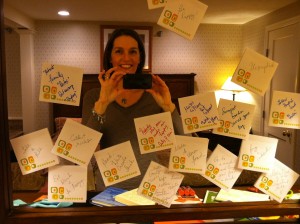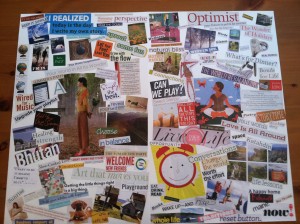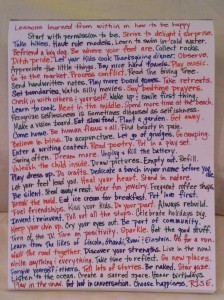People amaze me. There are moments everyday in my life that I sit in complete awe of the men, women, and children who walk this earth. This happens even more frequently before, during, and after the Business Innovation Factory summit, AKA BIF. So much so that I wrestle with the idea that I often nonchalantly refer to BIF as a “business conference.” It is so much more. It is a PEOPLE MOVEMENT.
Last week, I had the honor of interviewing Steve Cronin, a Rhode Islander who has leveraged BIF as one of the many ways he is helping change the world one student at a time. Steve is the president of TWOBOLT, a longstanding direct marketing company in Pawtucket, RI. But, if you ask me, his greatest influence has nothing to do with marketing and everything to do with his direct impact on kids.
Beyond curriculum: teaching kids life skills
As a way to give back to the community, Steve teaches a weekly class at Hope High School centered on life skills, namely leadership, change, and success. His ultimate goal is to help students achieve the success they aspire. One of his core messages to his students, perhaps even above and beyond teaching leadership concepts and skill development, is: “You don’t know how great you are right now!”
“These kids are so smart, so creative, and have so much potential,” said Steve. “Part of my challenge is to let them know this – and to give them strategies to help exploit their potential.”
Steve believes in his students. And he knows beyond a shadow of a doubt, that if they master fundamental skills such as networking, critical thinking, risk management, interpersonal, creativity, and empathy, they will realize their dreams. They will thrive.
There’s more than one way to learn
Steve gets kids. He understands that students come from diverse backgrounds, face different challenges and opportunities, and learn in a variety of ways. This is why he caters to each student going so far as to create personalized textbooks for his students. He also includes TAGs throughout these books so students who more readily process video information than text can learn that way.
Steve invites the community into his classroom, as well. This allows students to interact with the real world and hear stories that might resonate with their own and give them hope. Local leaders who’ve participated include the likes of U.S. Federal Attorney Richard Rose; double amputee and Providence native featured in Mark Patinkin’s inspirational book Up and Running Andre Bateso; and nationally recognized creativity professor Amy Whitaker.
And, of course, Steve gets his students out of the classroom. They tour colleges, visit local businesses, have an opportunity to attend the National Youth Leadership Forum in Washington, DC, and, yes, participate in BIF!
Students experience the magic of BIF
Ah, BIF magic. Believe it. It’s real. Thanks to people like Steve Cronin more students are experiencing it. For the past several years, Steve attended BIF with his students in tow. This year, he took five of them, dubbing them, “The Fab Five.”
“What an opportunity for these kids,” said Steve. “It’s exhilarating to watch them, to see them take risks, to meet seemingly intimidating people, and to see how they carry themselves.”
Although Steve’s students are quick to share vast feedback, nearly all of their thoughts can be summarized in one word, “Wow!” Like Steve, they were simply in awe of the storytellers and overall BIF experience.
“I cannot thank Chris and Saul at BIF enough,” said Steve. “The opportunity they’ve given these kids is unbelievable. BIF is a wonderful chance for students to meet people different than themselves and to see what is possible if they do the right things.”
Never too old to learn
Steve’s students learned a lot at BIF. And, they’ve learned a lot from him. I did, too. Steve’s life lessons aren’t reserved for students. He’s impacting people like me, too.
Here are just a few lessons I took away from my conversation with Steve that all students – all people – can learn from:
- Talk to strangers! Build networks!
We tend to hang out with people who are similar to us. Mix it up! Hang around good, honest, intelligent, hardworking people who have different interests, ethnicity, culture, education, and economic status. Build a network of successful people. If you hang with positive, smart people, you will become positive and smart.Who’s in your network?
- Ask! Just Ask!
How many people, even in business, just never ask? Steve thinks, too many! “We talk a lot about asking in my class,” said Steve. “It’s a big deal – part of life is to ask.” He stresses that asking should always be done in a respectful manner, but that it should be done. Case in point: Four of his five students who participated in BIF went one day. One student went two days simply because she asked! “One girl asked to go a second day, and I found a way to make it happen.”Are you asking enough?
- Show up!
Sounds simple, doesn’t it? But, Steve cannot stress this enough. “You create opportunities in life just by showing up,” he said. And, show up on time. “Showing up late for class is the ultimate expression of disrespect for a teacher, and this translates to work,” he said. “If you work for me and you’re late, you don’t last.”Show up any chance you have – class, work, BIF, whatever. You never know what possibilities lay ahead.
Do you show up?
- Tell your story!
Over the years, many students have touched Steve. One in particular is Marta Aparicio, who was born in Guatemala and came to the United States at age 12 with her grandmother. Throughout high school, Marta worked at a nearby hospital 30 hours/week, played soccer, and was ranked among the top five in her class.One day, Marta approached Steve and said she wanted to go the National Youth Leadership Forum. No one from his class had ever attended. He simply said, “Tell me your story.” She did. Not only did Marta attend the forum, but today she is also a junior at Georgetown University on full scholarship.
Your story matters.
- Don’t quit!
The first day of the National Youth Leadership Forum, Marta called Steve. She shared that all of the kids at the conference were “white, affluent, and from private schools.” He told her she could do it. By the end of the conference, Marta was sharing her wonderful experience on Facebook. During Marta’s first year at Georgetown she once again doubted her ability to continue. She felt surrounded by rich, smart kids whose first language was English. Again, Steve encouraged her to press on. Today, Marta has found her niche, is thriving, and never wants to leave. She’s learned that kids might have different skin color, come from different backgrounds, etc., but they have similar aspirations of becoming successful, of being happy.Can you muster the strength to keep trying?
Steve wrapped up our conversation by sharing: “These kids inspire me. My challenges pale in comparison to the ones they face. I get more out of this than they do.”
That’s saying a lot because I suspect these kids get a lot out of Steve’s class. But, I think he’s got it right. Life’s about inspiring each other, learning together, and recognizing we all have challenges. It’s about being there for one another, creating the life we want, and realizing our dreams.
Mostly, it’s about PEOPLE. Just like BIF.



